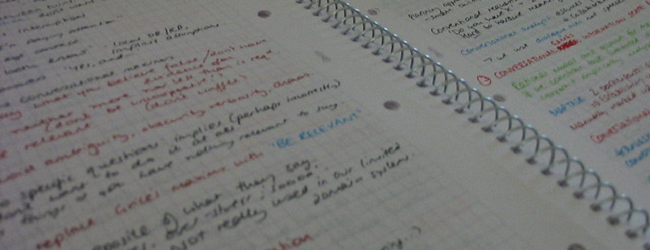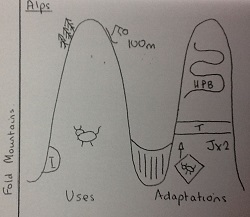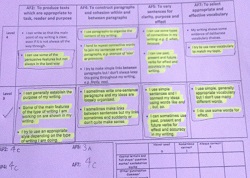Too much to do and too little time. That’s what I hear from both teachers and students. Students of the new two-year A Level specifications are stressed out about having to know two years’ worth of content all at once. Teachers are trying to cram revising the whole syllabus into a few short weeks of contact time.
I’m teaching the new GCSE English specification for the first time this year and I’m not going to lie, I’m pretty nervous about it. The rest of my department have had a year to get to grips with it all and fine tune it, so while I’m getting what I can from them, I also need to make it work for the students in front of me, and not someone else’s class. With four hours of lessons per week, and three years before their final exams, there’s a lot of time to embed good working habits with my class - no matter how resistant they’re currently being!
Whether it be individual lessons, schemes of work or curriculum, it’s very easy to focus on what is being taught in a school. But how often do you stop to consider effective ways to ensure that students remember content and are able to recall and utilise it at a later date? What strategies can be used to ensure that the teaching going on in their establishment really ‘sticks’ and in doing so, ensure long-term value to planning, quality and practice? Being aware and engaging in the science of learning and the research that surrounds it, means that practitioners not only concentrating on passing on knowledge, they’re taking steps to ensure that it isn’t lost after they do.
If students love revising, then they love learning and their progress will improve as a result. Therefore, to engage all students in revision we have been bringing it alive as a school. Here are five strategies we have used, particularly to ensure our most able students increase the depth of understanding needed as they chase their A*s.
As a PE teacher of many years, one area that I have traditionally struggled with was supporting students to be able to write high-quality extended essays for the A2 exam paper. I always seemed to struggle with the ability to help students write concisely, using technical language and actually answer the question that was posed rather than the question they wish had been posed!
It’s evident that being a sufferer of dyslexia can mean taking on a huge amount of hard work, particularly when it comes to revising for exams. That’s why it’s important for teachers of dyslexic students to be well prepared to help with learning needs. With this in mind, Glasgow teacher David Imrie gives his best advice on the matter.

With GCSEs starting in May, it’s important that dyslexic students are provided with support and assistance from teachers to help them achieve their best grades.

Over the last couple of years, Deputy Head and Geography teacher Chris Woodcock has been trying to develop strategies to support and challenge the low ability students he teaches.
Being a content heavy subject, these students struggle to recall the knowledge required to answer exam questions effectively, and as a result, they have been missing out on valuable marks. With this in mind, Chris wanted to develop a quick and easy strategy they could use to improve their recall of information. He has been doing this by using very simple diagrams as visual prompts.
So, having taught a topic, a simple diagram is used to summarise the main ideas. This can be easily memorised and then used to recall the main facts - an example follows:
Consolidating new information can be a very difficult process for students, particularly if they don't understand the main elements of a fact or concept. Using the iPad combined with suitable apps that are flexible enough to cater for their creative and imaginative minds, however, students are given full control over the subject from researching it to sharing and presenting it to the class.

When it comes to learning new knowledge and facts relating to a topic, it can sometimes be tricky to find tasks that help children share their learning so that they retain the information.
I have seen many lessons and work in books that just seem to involve research and simply copying it into books. I always question how much knowledge the children can recite from this approach.
The iPad is now transforming the way children demonstrate their learning and recently a class of Year 2 children have been using different approaches relating to the same topic of animals in the Savannah to show how these activities are making the new found knowledge stick.
Having students identify for themselves where they think they need to improve and then comparing this to their performance on a task will give an accurate insight into which parts of the criteria they do not understand how to satisfy. The teacher can then point this out and explain how it can be achieved. A good method to conduct this is by using 'predictive grids':

Too often, students see the grade that they receive and do not take enough notice into the written feedback that is given during marking. Dylan Wiliam's suggestion of not giving the grade to the students works but I've been wanting the students to engage with the success criteria when it comes to their exams and they really are incredibly motivated by seeing the grades, or even a number.
Something suggested by a colleague, which I've started to implement with exam classes, is 'predictive grids'. These are success criteria grids (usually using the exam board language as much as possible) which the students highlight according to what they think they achieved in the piece of work. This can either be done directly after the piece of work is finished or the lesson after which is what I usually prefer to do. When the work is marked, the teacher can then see where specifically the students are not achieving, but also see if the students know if they are not achieving in that particular area.

A community-driven platform for showcasing the latest innovations and voices in schools
Pioneer House
North Road
Ellesmere Port
CH65 1AD
United Kingdom